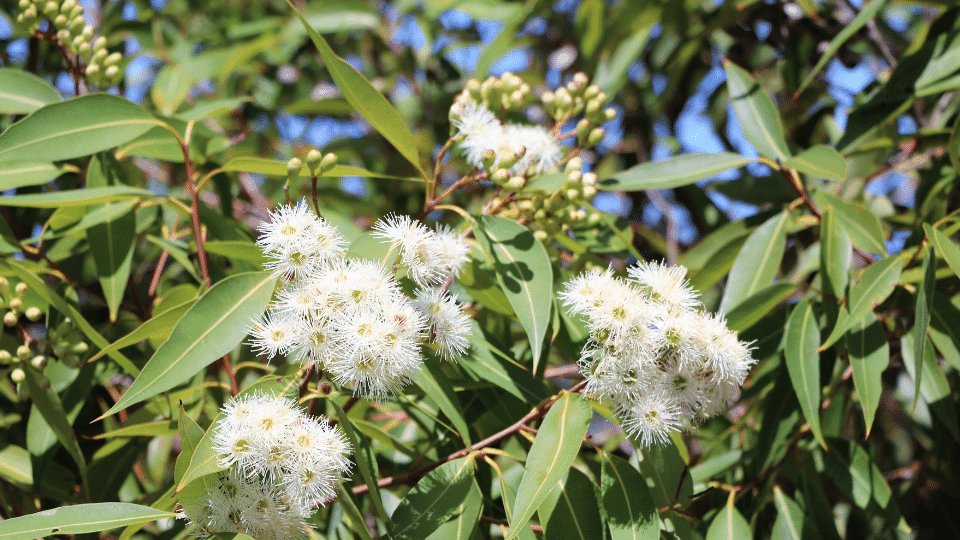Plunkett Mallee (Eucalyptus curtisii)
Connecting Communities Native Seed Project – 2023 Update
Author: Nicholas Groenenberg
Since 2016, Natura Pacific has headed up an amazing project in South East Queensland to save native seeds from development areas and grow them into young plants for conservation areas. To date, over 7 million seeds of 136 species have been saved and so far, over 43,000 have been planted across 54 locations. The project does this by way of a remarkable team including environmental scientists, university students, prisoners who grow the plants at 3 correctional centres in the region, landscapers and community volunteers.
After collecting the seeds, our teams sort them and remove the husks and debris to prepare them for planting. Subsequently, the seeds are transported to three correctional centres. At these facilities, a specialized team along with prisoners who’ve learnt how to grow native plants through training, turn the seeds into young plants. The inmates diligently grow as many plants as possible from the seeds. The plants are nurtured in small trays and transplanted into small tubes, preparing them for distribution to various sites. In the final stage of this project, the young plants are reintroduced into environments where they can flourish and thrive. The specific destinations of these plants may vary over time, aligning with the evolving requirements of both the environment and the community (Natura Pacific, 2018).
Natura Pacific’s native seed project has proven beneficial to the conservation of many species and has been a fantastic way to collaborate with schools, community groups and developers to plant more natives in conservation areas, from saved genetic stock. This project regularly brings the community together for enriching and engaging tree-planting days brimming with education, enthusiasm, and advocacy for our native species. Teachers and students alike express joy as they plant trees and eagerly immerse themselves in the hands-on experience, getting their hands dirty while contributing to the project’s success (Natura Pacific, 2020). Recent events have taken place at Moffatt Park, Logan, at Yarrabilba Priority Development Area, in Currumbin Valley and across five private properties around Girraween National Park. To explore the origins of all of the seeds we’ve collected since 2016 and their ultimate destinations. We teamed up with Frederic Fery, a local Viz for Social Good volunteer and board member and Nic Groenenberg completing his internship with us from Griffith University, to create the Tableau infographic below. Check it out!
This project is responsible for conserving many species but focuses on two threatened species: the Plunkett Mallee (Eucalyptus curtisii) which is listed as near threatened (Collingwood et al., 2019) and the Weeping Paperbark (Melaleuca irbyana) listed as endangered (Department of Climate Change, Energy, the Environment and Water, 2013).
The Weeping Paperbark has a scattered distribution throughout South East Queensland. This tree establishes numerous significant species associations. For instance, the Grey-headed Flying-fox feeds on its blossoms, aiding in pollination. Additionally, reptiles and frogs utilize the fallen branches as habitat, while the Tick Orchid (Dendrobium linguiforme) adorns the papery branches of these trees. However, the Weeping Paperbark faces various threats, including habitat clearing for urban and agricultural development, bushfires, invasive species, and a lack of genetic diversity due to its small, isolated populations (NSW Office of Environment and Heritage, 2022).
The Plunkett Mallee is a rare tree found only in Logan and Ipswich areas, and is facing a decrease in population (Collingwood et al., 2019). This tree faces various threats, such as habitat clearing for residential and commercial development, mining, and coal seam gas extraction (Collingwood et al., 2019).
Through collaborative conservation, we will see many benefits including raising awareness, engaging the community and increasing our native species. Our hope is that the Connecting Communities Project will continue to grow into the future, and provide much-needed support to our region’s remarkable native flora.
Reference List:
Collingwood, T., Laffineur, B., & Fensham, R. (2019, March 21). IUCN Red List of Threatened Species: Eucalyptus curtisii. IUCN Red List of Threatened Species; Name. https://www.iucnredlist.org/species/133379850/133379852
Department of Climate Change, Energy, the Environment and Water. (2013). Threatened Ecological Community Profile — Swamp Tea-tree (Melaleuca irbyana) Forest of South-east Queensland. Environment.gov.au; jurisdiction=Commonwealth of Australia; corporateName=Department of the Environment. http://www.environment.gov.au/cgi-bin/sprat/public/publicshowcommunity.pl?id=33
Natura Pacific. (2018). Native seeds creating community connection. Natura Pacific. https://www.natura-pacific.com/native-seeds-community-connection/
Natura Pacific. (2020). Melaleuca Irbyana Tree Planting Day. Natura Pacific. https://www.natura-pacific.com/melaleuca-irbyana-tree-planting-day/
NSW Office of Environment and Heritage. (2022). Weeping Paperbark – profile | NSW Environment, Energy and Science. Www.environment.nsw.gov.au. Retrieved May 26, 2023, from https://www.environment.nsw.gov.au/threatenedspeciesapp/profile.aspx?id=10518
South East Queensland is a biodiversity hotspot for native plants, with some species found nowhere else on earth. Among the dry sandstone ridges around Logan and Ipswich cities, some plants have evolved special adaptations to survive the tough conditions out in the sun. But while they have evolved into a plethora of different shapes and sizes to suit the trials of life, they have suffered from the impacts of land clearing and infrastructure development. Thanks to a new regional project, however, there is hope. This is the story of the Plunkett Mallee.
Back from the Brink is bringing you a brand new season of discovery! This is a story of how an army of volunteers, ecologists, developers, prisoners, teachers and students from across Logan and Ipswich are rallying together to save a species from extinction.










